Related Research Articles

Asia is the largest continent in the world by both land area and population. It covers an area of more than 44 million square kilometers, about 30% of Earth's total land area and 8% of Earth's total surface area. The continent, which has long been home to the majority of the human population, was the site of many of the first civilizations. Its 4.7 billion people constitute roughly 60% of the world's population, having more people than all other continents combined.

Bangladesh, officially the People's Republic of Bangladesh, is a country in South Asia. It is the eighth-most-populous country in the world, with a population of around 169 million people in an area of 148,460 square kilometres (57,320 sq mi). Bangladesh is among the most densely populated countries in the world, and shares land borders with India to the west, north, and east, and Myanmar to the southeast; to the south it has a coastline along the Bay of Bengal. It is narrowly separated from Bhutan and Nepal by the Siliguri Corridor; and from China by the Indian state of Sikkim in the north. Dhaka, the capital and largest city, is the nation's political, financial and cultural centre. Chittagong, the second-largest city, is the busiest port on the Bay of Bengal. The official language is Bengali, one of the easternmost branches of the Indo-European language family.

A geographer is a physical scientist, social scientist or humanist whose area of study is geography, the study of Earth's natural environment and human society, including how society and nature interacts. The Greek prefix "geo" means "earth" and the Greek suffix, "graphy", meaning "description", so a geographer is someone who studies the earth. The word "geography" is a Middle French word that is believed to have been first used in 1540.

Kazi Nazrul Islam, popularly known as Nazrul, was a Bengali poet, writer, musician, and is revered as the national poet of Bangladesh. Regarded as one of the greatest poets in Bengali literature, Nazrul produced a large body of poetry, music, messages, novels, and stories with themes that included equality, justice, anti-imperialism, humanity, rebellion against oppression and religious devotion. Nazrul Islam's activism for political and social justice as well as writing a poem titled as "Bidrohī", meaning "the rebel" in Bengali, earned him the title of "Bidrohī Kôbi". His compositions form the avant-garde music genre of Nazrul Gīti.

The Bangladesh Liberation War was a revolution and armed conflict sparked by the rise of the Bengali nationalist and self-determination movement in East Pakistan, which resulted in the independence of Bangladesh. The war began when the Pakistani military junta based in West Pakistan—under the orders of Yahya Khan—launched Operation Searchlight against the people of East Pakistan on the night of 25 March 1971, initiating the Bangladesh genocide.

The Barelvi movement, also known as Ahl al-Sunnah wa'l-Jamaah is a Sunni revivalist movement following the Hanafi and Shafi'i schools of jurisprudence, and Maturidi and Ashʿari schools of theology with strong Sufi influences and with over hundreds of millions of followers in South Asia and also in parts of Europe, America and Africa. It is a broad Sufi-oriented movement that encompasses a variety of Sufi orders, including the Chistis, Qadiris, Soharwardis and Naqshbandis as well as many other orders and sub-orders of Sufism. They consider themselves to be the continuation of Sunni Islamic orthodoxy before the rise of Salafism and Deobandi Movement.
Ahmad Hassan Dani FRAS, SI, HI was a Pakistani archaeologist, historian, and linguist. He was among the foremost authorities on Central Asian and South Asian archaeology and history. He introduced archaeology as a discipline in higher education in Pakistan and Bangladesh. Throughout his career, Dani held various academic positions and international fellowships, apart from conducting archaeological excavations and research. He is particularly known for archaeological work on pre-Indus civilization and Gandhara sites in Northern Pakistan.
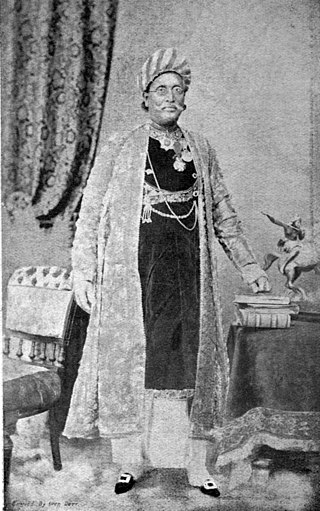
Nawab Bahadur QaziAbdul Latif was a Bengali Muslim aristocrat, educator and social worker. His title, Nawab was awarded by the British in 1880. He was one of the first Muslims in 19th-century India to embrace the idea of modernisation.
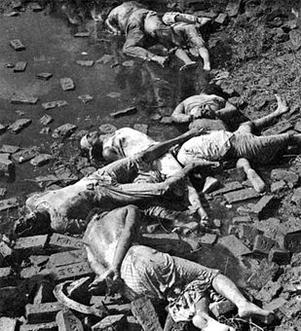
The Bangladesh genocide, also known as the Gonohotta, was the genocide of Bengalis of East Pakistan during the Bangladesh Liberation War. It began on 25 March 1971 with the launch of Operation Searchlight, as the government of Pakistan under Yahya Khan, dominated by West Pakistan, began a military crackdown on East Pakistan to suppress Bengali calls for self-determination. During the nine-month-long war, members of the Pakistan Armed Forces and supporting pro-Pakistani Islamist militias from Jamaat-e-Islami killed between 300,000 and 3,000,000 people and raped between 200,000 and 400,000 Bengali women, in a systematic campaign of genocidal rape. The genocide mainly targeted the Hindu population in East Pakistan, leading to the killing and displacement of a large number of Bengali Hindus from the region. The International Commission of Jurists concluded that the genocide involved the attempt to exterminate or forcibly remove a significant portion of Hindus from the country.

Maulana Azad College is a public institute of liberal arts, commerce and science in India, located in central Kolkata, West Bengal, India. The college is fully government-administered. It is located near the junction of Rafi Ahmed Kidwai Road and SN Banerjee Road, popularly called "Lotus crossing".
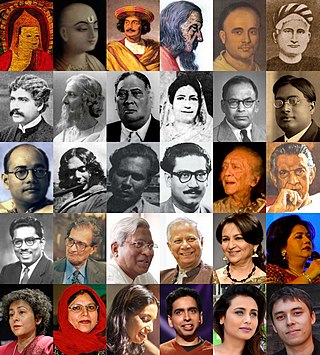
Bengalis, also rendered as Bangalee or the Bengali people, are an Indo-Aryan ethnolinguistic group originating from and culturally affiliated with the Bengal region of South Asia. The current population is divided between the independent country Bangladesh and the Indian states of West Bengal and Tripura, Barak Valley, Andaman and Nicobar Islands, Jharkhand and part of Meghalaya and Manipur. Most of them speak Bengali, a language from the Indo-Aryan language family.

Geography is a field of science devoted to the study of the lands, features, inhabitants, and phenomena of Earth. Geography is an all-encompassing discipline that seeks an understanding of Earth and its human and natural complexities—not merely where objects are, but also how they have changed and come to be. While geography is specific to Earth, many concepts can be applied more broadly to other celestial bodies in the field of planetary science. Geography has been called "a bridge between natural science and social science disciplines."

The Indian subcontinent is a physiographical region in Southern Asia, situated on the Indian Plate, projecting southwards into the Indian Ocean from the Himalayas. Geopolitically, it spans major landmasses from the countries of Bangladesh, Bhutan, India, Maldives, Nepal, Pakistan, and Sri Lanka. Although the terms "Indian subcontinent" and "South Asia" are often used interchangeably to denote the region, the geopolitical term of South Asia frequently includes Afghanistan, which is not considered part of the subcontinent.
Nurul Momen was a Bangladeshi playwright, educator, director, broadcast personality, orator, academician, satirist, essayist, translator and poet. He served as a faculty member in the capacities of professor and dean at the faculty of Law in the University of Dhaka. He also served as a lawyer. He is called "Father of Bangladeshi theatre" and "Natyaguru" of Bangladesh. He was awarded the Bangla Academy Award in 1961, merely a year after its inception. He was also honoured by the People's Republic of Bangladesh with the Ekushey Padak in 1978, only a couple of years after this State honor was introduced.
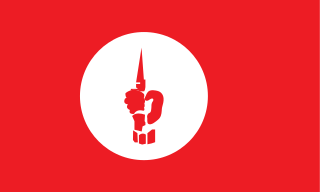
The Mukti Bahini, also known as the Bangladesh Forces, was the guerrilla resistance movement consisting of the Bangladeshi military, paramilitary and civilians during the Bangladesh Liberation War that transformed East Pakistan into Bangladesh in 1971. They were initially called the Mukti Fauj.
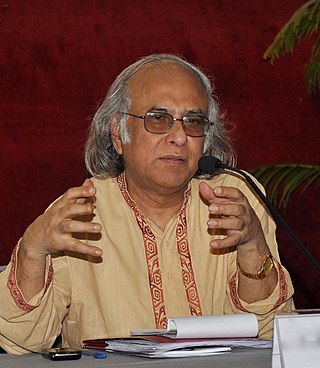
Qazi Kholiquzzaman Ahmad is a Bangladeshi economist and development thinker and activist. He is currently the chairman of Dhaka School of Economics (DScE), a constituent institution of the University of Dhaka, devoted to post-graduate studies in economics and related subjects. He is also the chairman of Palli Karma-Sahayak Foundation (PKSF), which is largest rural development funding, skill development and management support agency in Bangladesh. He received the highest national civilian award Independence Award 2019; and Ekushe Padak 2009, presented by the Government of Bangladesh.
The Aligarh Movement was the push to establish a modern system of Western–style scientific education for the Muslim population of British India, during the later decades of the 19th century. The movement's name derives from the fact that its core and origins lay in the city of Aligarh in Central India and, in particular, with the foundation of the Muhammadan Anglo-Oriental College in 1875. The founder of the oriental college, and the other educational institutions that developed from it, was Sir Syed Ahmed Khan. He became the leading light of the wider Aligarh Movement.
Noazesh Ahmed was a Bangladeshi geneticist and photographer.
Nafis Ahmad (1911-1982) was a Bangladeshi geographer and educationalist.
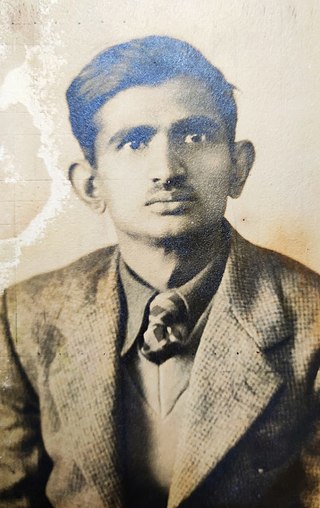
Enayat Ahmad was an Indian geographer known for his contribution to the study of the geography of India, especially his interpretation of the evolution of drainage systems in the Himalayas and his writings on tropical coastal geomorphology. He wrote books on geomorphology, geology, and the Himalayas in addition to papers in academic journals.
References
- ↑ Kinnaird, Vivian; Momsen, Janet (2002). Different Places, Different Voices: Gender and Development in Africa, Asia and Latin America. Routledge. p. 79. ISBN 978-1-134-90402-0.
- ↑ Geographical Review of India. Geographical Society of India. 1972. p. 192.
- ↑ "River-linking to spell disaster for both Bangladesh, India". archive.thedailystar.net. The Daily Star. Archived from the original on 11 January 2020. Retrieved 25 January 2020.
- ↑ "'Develop human resources to resolve migrant workers' issue'". The Daily Star. 1 July 2008. Retrieved 25 January 2020.
- 1 2 Baby, Sultana Nasrin. "Bangladesh Geographical Society". Banglapedia. Retrieved 25 January 2020.
- ↑ Castree, Noel; Kitchin, Rob; Rogers, Alisdair (2013). A Dictionary of Human Geography. OUP Oxford. p. 577. ISBN 978-0-19-959986-8 . Retrieved 25 January 2020.